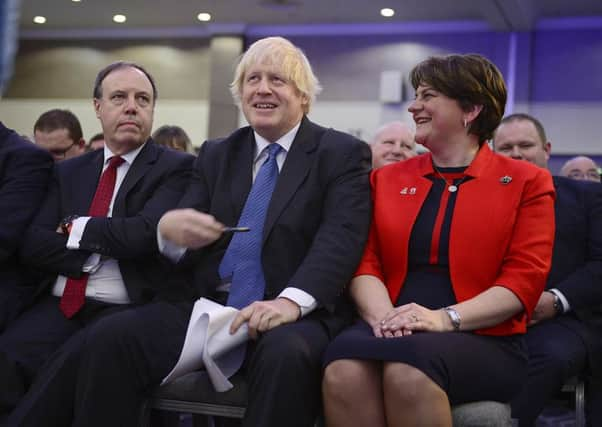Ben Lowry: DUP has put its faith in Boris Johnson, but he is losing control of events


Details about post Brexit rules and checks are complicated.
But the more important question now is whether or not the DUP will have influence over events in coming weeks, or indeed whether the government will have influence.
Much will depend on the outcome of the Supreme Court hearing on Tuesday on the pro-roguing of Parliament by Boris Johnson — objections to which were heard in the Scottish, English and NI courts.
Advertisement
Hide AdAdvertisement
Hide AdEven if the government wins that case, some MPs — such as the anti-Brexit backbencher Oliver Letwin, who was recently among those Tories banished from their party —believe it will be unable to call a general election until 2020, or after a fresh referendum on Brexit.
Reportage of government thinking and actions suggests that Mr Johnson and his advisors genuinely preferred a ‘No Deal’ Brexit to the Withdrawal Agreement (WA), with its backstop.
A problem for unionists is that the government is losing control of events. It might yet, after the return of Parliament, feel so constrained that it has no option but to force through a version of Theresa May’s Withdrawal Agreement (WA), which the expelled Tories and moderate Labour MPs back.
Yesterday I talked to Nigel Dodds, to ascertain the latest DUP position, and he Friday’s report The Times that the party would drop its objections to regulatory checks in the Irish Sea was wrong. The DUP Westminster leader had already said they would be open to diverging from Great Britain in specific areas if Stormont agreed.
Advertisement
Hide AdAdvertisement
Hide AdWhen I asked if the DUP was moving towards acceptance of an all-island approach to agri-food (widening Irish Sea checks that already apply to animal loads), he again cited a Stormont caveat: possible if the assembly agrees.
Mr Dodds said the DUP meeting with Mr Johnson in Downing Street last week had been reassuring, and was followed by the prime minister restating his opposition to a Northern Ireland-only backstop.
But unionists are not in the clear. At last November’s DUP conference, Mr Johnson was scathing about the backstop’s damage to the Union, then voted for it in March.
There is an alarming report he is thinking along such lines. Apparently, pleading with pro-EU Tories to support him, he said: “The spears in my back won’t be from you, they’ll come from the Spartans.”
Spartans are Brexit purists.
Advertisement
Hide AdAdvertisement
Hide AdThat comment, if accurately reported, suggests he is already thinking of compromise. Given that the Irish border remains the biggest Brexit obstacle, compromise would likely relate to Northern Ireland.
Another, separate, difficulty is that Boris Johnson might get his general election and win an overall majority (distinctly possible, but far from certain), in which case he might do what Mrs May would have done in 2017 had she won such a majority: an Irish Sea border.
This would not be the preferred outcome for either prime minister, but might be thought the least bad outcome for either in the face of an implacable European Union.
The EU has little reason to waver from that implacability, when it can see that the House of Commons is trying to rule out ‘no deal’ (regardless of EU terms) or when there is a prospect of a second referendum.
Advertisement
Hide AdAdvertisement
Hide AdJim Allister is right to say that “any acceptance – howsoever processed – of EU single market rules in any sector of the Northern Ireland economy would result in consequential Irish Sea checks for that sector” and would lead to “slithering down a slippery slope of divergence.” But if unionists emerge from Brexit with only agri-food alignment with EU, that will be far less grim than the overall backstop.
The Times reported that the DUP was open to some regulatory divergence if NI was allowed to leave the customs union. If that led to NI staying largely in the single market but fully out of the customs union, with the land border policed lightly for tariffs, that too would — in constitutional unionist terms — be far from the worst outcome.
The backstop as is has Great Britain in ‘a’ customs union but NI in ‘the’ CU. Middle England will ultimately reject the former and break free. NI would not be able to. There would be a full Irish Sea trade border, for standards of goods (regulations) and customs (tariffs).
If Brexit was a success and the EU struggled, and GB pulled ever further away, we would forever be on the EU side.
• Ben Lowry (@BenLowry2) is News Letter deputy editor